#Frederick Treves
Text
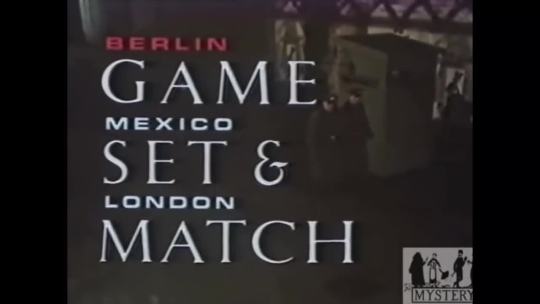
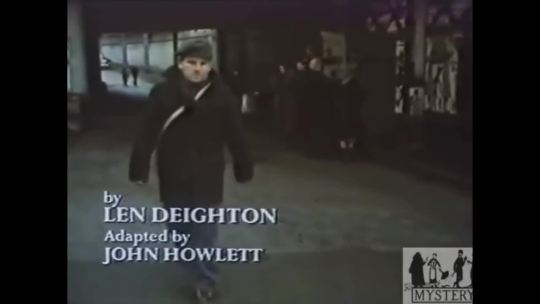
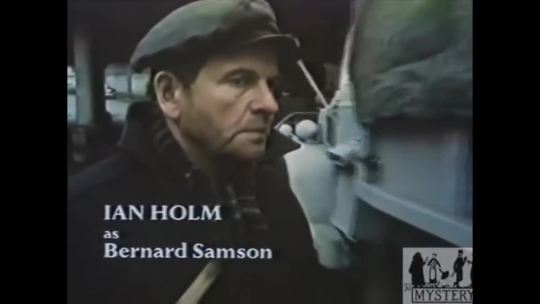
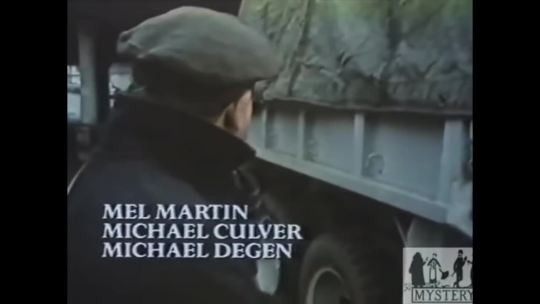
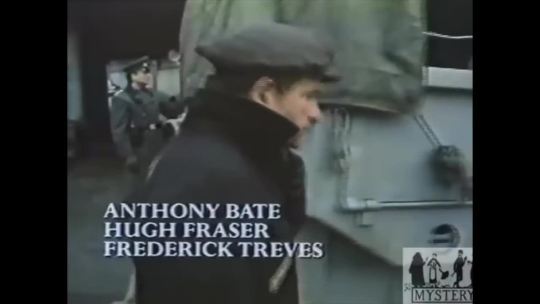

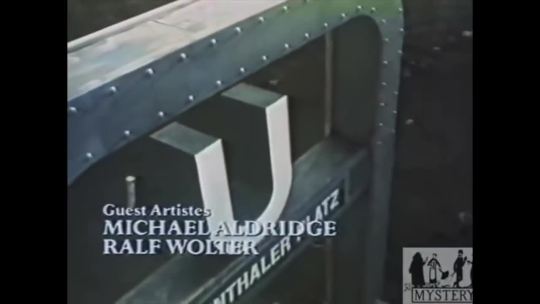
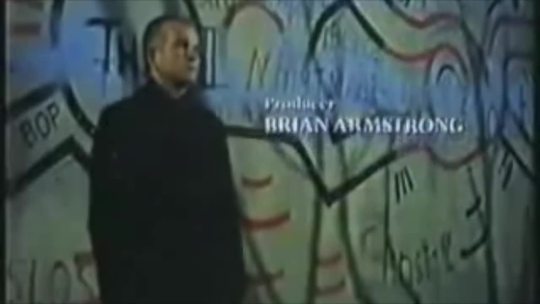

Game, Set and Match - ITV - October 3, 1988 - December 19, 1988 / PBS - March 23, 1989 - June 8, 1989
Drama (13 Episodes)
Running Time: 60 minutes
Stars:
Ian Holm as Bernard Samson
Mel Martin as Fiona Samson
Michael Culver as Dicky Cruyer
Michael Degen as Werner Volkmann
Gottfried John as Eric Stinnes
Anthony Bate as Bret Renssalaer
Frederick Treves as Frank Harrington
Amanda Donohoe as Gloria Kent
Hugh Fraser as Giles Trent
Gail Harrison as Tessa Kozinski
Gary Whelan as George Kozinski
Brigitte Karner as Zena Volkmann
Alan MacNaughtan as Sir Henry Clevemore DG
Michael Aldridge as Silas Gaunt
Peter Vaughan as David Kimber-Hutchinson
Eva Ebner as Frau Lisl Hennig
Jeremy Child as Henry Tiptree
Ralf Wolter as Juri Rostov
#Game Set Match#TV#ITV#PBS#1988#1989#1980's#Drama#Ian Holm#Mel Martin#Michael Culver#Michael Degen#Anthony Bate#Frederick Treves
2 notes
·
View notes
Text


Tiny snippet from a comic im working on set in victorian london. It follows the bizarre adventures of a gang of circus freaks who call themselves the Laughing Academy.
#comic#art#victorian#history#frederick treves#joseph merrick#conjoined twins#freakshow#dark comedy#the elephant man
15 notes
·
View notes
Text
"SILAS MARNER" (1985) Review
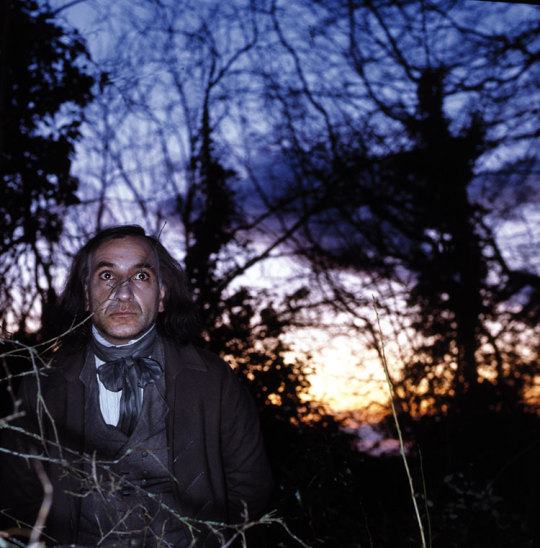
"SILAS MARNER" (1985) Review
I have seen a handful of television and movie adaptations of novels written by George Eliot. But the very first adaptation I ever saw was "SILAS MARNER", the 1985 version of Eliot's third novel published back in 1861. My recent viewing of the production led me to reassess it.
"SILAS MARNER" begins with an English weaver living with a small Calvinist congregation in Lantern Yard, a slum street in a Northern England city. His life falls apart when he is framed for stealing the church's funds, while watching over the congregation's ill deacon. Worse, his fiancee leaves him for his so-called best friend, the very man who may have framed him. Shattered and embittered, Silas leaves Lantern Yard and arrives at a rural village in the Midlands called Raveloe. Although he resumes his trade as a weaver, Silas' traumatized past leads him to achieve a reputation as a miser and a loner in the community.
Silas' move to Raveloe eventually leads him to cross paths with the community's leading citizens, the Cass family. The head of the latter is the elderly Squire Cass who has two sons - Godfrey and Dunstan. Godfrey, who is the squire's heir is secretly married to one Molly Farren, a lower-class woman and opium addict from another town, who has given birth to his young daughter. Godfrey is also engaged to a young middle-class woman named Nancy Lammeter. Dunstan is a dissolute wastrel who constantly loses money via excessive gambling. One night, a drunken Dunstan breaks into Silas' cottage, steals the gold coins that the latter has been hoarding and disappears. Through a series of events, Molly plots to expose her marriage to Godfrey and their child during the Cass family's New Year party, but dies in the snow before she can reach it. Silas, who is emotionally upset over the loss of his coins, finds both the dead Molly and the child. Although he informs the partygoers of Molly's death and the child, he assumes guardianship of the latter (renamed Hephzibah "Eppie"), much to the relief of Godfrey, who can now legally marry Nancy. All goes well until Godfrey and Nancy's failure to have children threaten Silas' newfound happiness as Eppie's father years later.
What can I say about "SILAS MARNER"? I can honestly say that it was not one of the best adaptations of a George Eliot novel. Then again, I do not consider the 1861 novel to be one of her best works. I realized that Eliot had set the story either around the end of the 18th century or around the beginning of the 19th century. It was her prerogative. But both the novel and the movie seemed to reek of Victorian melodrama that I found myself feeling that Eliot or any adaptation could have set the story around the time it was originally written and published - the mid 19th century. The story is, at best, a good old-fashioned Victorian melodrama. I would never consider it as particularly original in compare to the likes of "MIDDLEMARCH" or "DANIEL DERONDA".
"SILAS MARNER" tries its best to be profound on the same level as the other two Eliot stories I had mentioned. But I had a few problems with the narrative. What was the point behind Dunstan Cass' disappearance and theft? Yes, he stole Silas' hard earned money before he disappeared. I got the feeling that the stolen coins seemed to serve as a prelude to Silas' emotional attachment to Eppie. But why have Dunstan take it? How else did his disappearance serve the story . . . even after his dead remains were found close by, years later? In Eliot's novel, the discovery of Dunstan led brother Godfrey to form a guilty conscience over his own secret regarding young Eppie and confess to his wife. But in the movie, it was Godfrey and Nancy's inability to conceive a child that seemed to finally force the former to confess. Unless my memories have played me wrong. Frankly, Dunstan struck me as a wasted character. Anyone else could have stolen Silas' money.
I also noticed that Giles Foster, who had served as both screenwriter and director for this production, left out a few things from Eliot's novel. I have never expect a movie or television to be an accurate adaptation of its literary source. But I wish Foster had shown how Eppie's presence in Silas' life had allowed him to socially connect with Raveloe's villagers. Eliot did this by allowing her to lead him outside, beyond the confines of his cottage. The only person with whom Silas managed to connect was neighbor Dolly Winthrop, who visited his cottage to deliver him food or give advice on how to raise Eppie. I also noticed that in the movie, Silas had never apologized to another villager named Jem Rodney for his false accusation of theft. And Jem had never demanded it. How odd. I also wish that Foster could have included the segment in which Silas had revisited his former neighborhood, Lantern Yard. In the novel, Silas' visit revealed how the neighborhood had transformed into a site for a factory and its citizens scattered to other parts. Silas' visit to his old neighborhood served as a reminder of how his life had improved in Raveloe and it is a pity that audiences never saw this on their television screens.
Yes, I have a few quibbles regarding "SILAS MARNER". But if I must be really honest, I still managed to enjoy it very much. Eliot had written a very emotional and poignant tale in which a lonely and embittered man finds a new lease on life through his connection with a child. Thanks to George Eliot's pen and Giles Foster's typewriter, this story was perfectly set up by showing how Silas Marner's life fell into a social and emotional nadir, thanks to the betrayal of a "friend" and the easily manipulated emotions of his neighbors.
Once Silas moved to Raveloe, the television movie did an excellent, if not perfect, job of conveying how he re-connected with the world. It was simply not a case of Silas stumbling across a foundling and taking her in. Even though he had formed a minor friendship with Mrs. Winthrop, having Eppie in his life managed to strengthen their friendship considerably. The movie's narrative also took its time in utilizing how the Cass family dynamics played such an important role in Silas' life in Raveloe. After all, Godfrey' secret marriage to Molly Farren brought Eppie into his life. And Dunstan's theft of his funds led Silas to re-direct his attention from his missing coins to the lost Eppie. And both Godfrey and Nancy Cass proved to be a threat to Silas and Eppie's future relationship.
The production values for "SILAS MARNER" proved to be solid. But if I must be honest, I did not find any of it - the cinematography, production designs and costume designs - particularly memorable. The performances in the movie was another matter. "SILAS MARNER" featured solid performances from the likes of Rosemary Martin, Jim Broadbent (before he became famous), Nick Brimble, Frederick Treves, Donald Eccles, Rosemary Greenwood; and even Elizabeth Hoyle and Melinda White who were both charming as younger versions of Eppie Marner.
Angela Pleasence certainly gave a memorable performance as Eppie's drug addicted mother, Molly Farren. Patsy Kensit not only gave a charming performance as the adolescent Eppie, I thought she was excellent in one particular scene in which Eppie emotionally found herself torn between Silas and the Casses. Freddie Jones gave his usual competent performance as the emotional Squire Cass, father of both Godfrey and Dunstan. I was especially impressed by Jonathan Coy's portrayal of the dissolute Dunstan Cass. In fact, I was so impressed that it seemed a pity that his character was only seen in the movie's first half.
I initially found the portrayal of Nancy Lammeter Cass rather limited, thanks to Eliot's novel and Foster's screenplay. Fortunately, Nancy became more of a central character in the film's second half and Jenny Agutter did a skillful job in conveying Nancy's growing despair of her inability to have children and her desperation to adopt Eppie. I thought Patrick Ryecart gave one of the two best performances in "SILAS MARNER". He did an excellent job of conveying Godfrey Cass' moral ambiguity - his secrecy over his marriage to Molly Farren, the passive-aggressive manner in which he "took care" of Eppie through Silas and his willingness to use Eppie as a substitute for his and Nancy's failure to have children. Ryecart made it clear that Godfrey was basically a decent man . . . decent, but flawed. The other best performance in "SILAS MARNER" came from leading man Ben Kingsley, who portrayed the title character. Kingsley did a superb job of conveying Silas' emotional journey. And it was quite a journey - from the self-satisfied weaver who found himself shunned from one community, to the embittered man who stayed away from his new neighbors, to a man experiencing the joys and fears of fatherhood for the first time, and finally the loving man who had finally learned to re-connect with others.
Overall, "SILAS MARNER" is more than a solid adaptation of George Eliot's novel. I did not find its production designs particularly overwhelming. I did enjoy Eliot's narrative, along with Giles Foster's adaptation rather enjoyable . . . if not perfect. But I cannot deny that what really made this movie work for me were the first-rate performances from a cast led by the always talented Ben Kingsley. Victorian melodrama or not, I can honestly say that I have yet to grow weary of "SILAS MARNER".
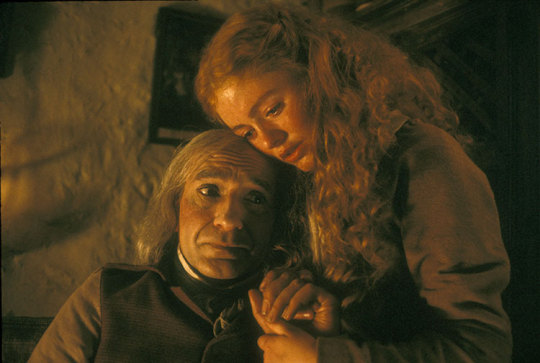
#george eliot#silas marner#silas marner 1985#ben kingsley#angela pleasence#donald eccles#freddie jones#jenny agutter#jonathan coy#jim broadbent#nick brimble#patsy kensit#patrick ryecart#giles foster#elizabeth hoyle#melinda whiting#rosemary martin#robert putt#frederick treves#rosamund greenwood#period drama#period dramas#costume drama
0 notes
Text



David Bowie as John Merrick in The Elephant Man, c. 1980
Photographer: Jim Britt
#(and with donal donnelly as Frederick Treves)#I say c. 1980 bc these were taken during the filming for an episode of Omnibus#which I believe aired in 1981 (and quite possibly was filmed in 1981)#but since the majority of bowie's run as merrick was in 1980 it just makes sense to say c. 1980 y'know#david bowie#bowieposting#the elephant man#80s#posted a couple of these on instagram initially but I like them so I'm posting them here too
73 notes
·
View notes
Text
A Tribute to Joseph Merrick
8 notes
·
View notes
Text
'The Elephant Man' (1980) film

-watched 6/5/2024- 4 stars- on Pluto tv (free)
92% Rotten Tomatoes
I don't guess I've ever watched this movie before, but I do remember it was highly regarded whenever it first came out.
#my have seen list#The Elephant Man#(1980)#film#david lynch#historical drama#biographical#john hurt#anthony hopkins#anne bancroft#sir frederick treves#freddie jones#john gielgud#wendy hiller#lesley dunlop#dexter fletcher#phoebe nicholls#michael elphick#helen ryan#hannah gordon#pat gorman#john standing#Pluto tv (free)
0 notes
Text
Sorry this is so long.
For David, Reece, & Joseph. Thank you.
Ok, so I did something special on the 17th September 2024.
I took my daughter, Raegan, to see 'The Elephant Man' at the BFI.
She is 14 and has seen the film before *many* times. She is a sweetheart. Not a bad bone in her.
I happen to think it is vitally important that more children are encouraged to watch this soul destroyingly beautiful film.
I was shocked, well more than shocked, a bit angry actually, at how few people at the screening hadn't seen this 44 year old MASTERPIECE...
But I'm not one to judge. Just be vaguely passive aggressive. 😅
My daughter was a great source of comfort as I find the scenes where John longs for and talks about his mother so difficult. I miss my children at the best of times when they aren't with me (I am soppy) so having her there was lovely. My little Rags.
As Carr Gomm says:
Can you imagine the kind of life he must have had?
Dr. Frederick Treves: Yes, I think I can.
Carr Gomm: I don't think so. No one could possibly imagine it! I don't believe any of us can!
Just the thought of having to go through everything he went through without his mother just kills me dead. The poor man.
The film was presented by 👑 Reece Shearsmith. He spoke so graciously and was lovely. Just lovely.
I'm so so thankful to him. What an opportunity. Certainly not one I could have missed.
I used to watch 'The Elephant Man' as a double with James Whales' 'The Old Dark House' at my grandparents house as a little girl, and to be able to **finally** watch it on the big screen. Wow.
NO pictures were taken by me.
**Nor would they ever be**
I respect him a lot & I always will.
That's all I'm going to say about Mr. Shearsmith.
So *please* don't ask.
---------------------------------------------------------
I cried like a baby from the moment Hannah Gordon's, (she's one of my literal HEROES - read me bio) Anne comes on the screen. Also, "No, you're a Romeo" and the ending where I just was a big ol' mess.
So for anyone who came that night and heard me gasping through tears at those bits, sorry.
Ruined my husbands jumper with my mascara too.
I will cry AGAIN If I say any more about the screening.
I also can't tell you how much of a David Lynch fanatic I am other than to say my son's name is Cooper and Twin Peaks is my life because he is.
------------------------------------------------------
Anyway - the point of this post 😅
When I got home I decided to draw John Merrick. He's been a part of my life, well, in a roundabout way, since I first saw the film at 8.
This is just pencil and it's arguably simple.
(Joseph Merrick is his real name. John for the film.)
The piece has two titles:-
Side 1 -
What John Has

Please play Barbers Adagio now below
Side 2 -
What John wants.

.

--Please watch--
'The Elephant Man' Dir. David Lynch 1980
If you can.
It becomes **very** difficult to be unkind to anyone after this film.
Inspo pics below
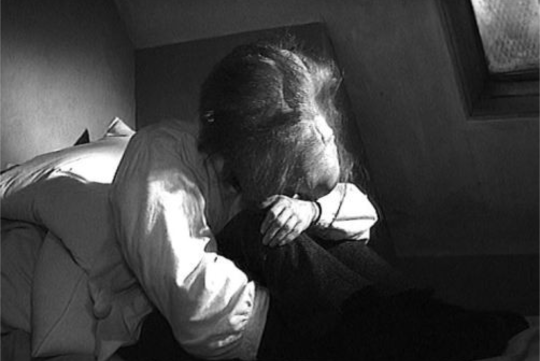

#the elephant man#katie steed art#pencil#drawing#horror art#be kind#Spotify#reece shearsmith#Reece Shearsmith is a king#David Lynch is a king#david lynch
5 notes
·
View notes
Text
Round One Part One - Match 9
What if a fucked up mirror killed you? Now imagine dying of blood poisoning. Which is worse? You decide!
MAG 156 - Reflection | Spotify - Acast - YT | Wiki | Transcript
Statement of Adelard Dekker, taken from a letter to Gertrude Robinson.
MAG 068 - The Tale of a Field Hospital | Spotify - Acast - YT | Wiki | Transcript
Statement of Joseph Russo regarding a book allegedly authored by Sir Frederick Treves.
#the magnus archives#the magnus tournament#tma#mag 156#mag 156 reflection#reflection#adelard dekker#the extinction#extinction#mag 068#mag 68#mag 068 the tale of a field hospital#mag 68 the tale of a field hospital#the tale of a field hospital#the corruption#corruption#joseph russo#john amherst#round one#round one part one
42 notes
·
View notes
Text


Joseph Merrick and
Dr. Frederick Treves.
Inspired by The Elephant Man (1980). I think it's time for bed



#the sims 4#the elephant man#the elephant man 1980#joseph merrick#john merrick#john hurt#anthony hopkins#david lynch#victorian#ts4 victorian cc#ts4 goth#ts4 cc#ts4 horror#ts4 simblr#ts4#ts4 cas#the sims 4 horror#ts4 gameplay#simblr#ts4 screenshots#ts4 historical#the sims 4 goth#Sweet dreams Joseph#you would have loved the sims.
6 notes
·
View notes
Text
Thus it came about that his death was due to the desire that had dominated his life- the pathetic desire to be like other people"
- The elephant man by Frederick treves
10 notes
·
View notes
Text
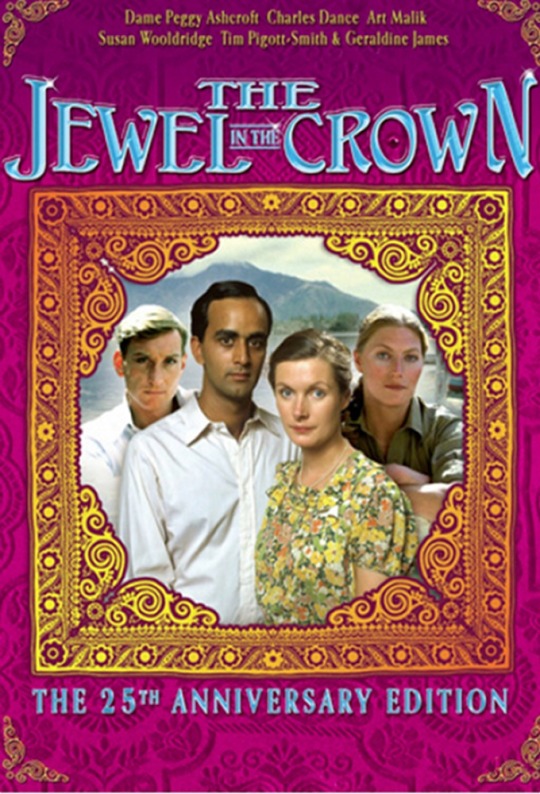
THE JEWEL IN THE CROWN (1984): Frequently interesting, never really satisfying 14-part Granada TV series, adapted by Ken Taylor from four novels by Paul Scott, about the final years of British rule of India (from about 1942 to 1947), set in a fictional province called Mayapore.
The first episode, which is two hours, adapts the title novel, about a young white Englishwoman named Daphne Manners (Susan Wooldridge) whose relationship with an Indian man called Hari Kumar (Art Malik), recently returned to India after attending an English public school, has disastrous consequences for them both, with Hari persecuted and eventually imprisoned at the behest of particularly racist and sadistic local police superintendent Ronald Merrick (Tim Pigott-Smith), a lower-middle-class functionary whose hatred and envy make him determined to put Hari in his place. This is by far the most cohesive portion of the story (although it's not very pleasant and needs CWs for rape and police brutality), and the only one whose main characters are particularly sympathetic, but it ends with Daphne dead, Hari in prison, their daughter Pavarti in the custody of Daphne's great aunt, and Merrick ascendant.
The remaining episodes shift focus to the upper-class Layton family, whose elder daughter Sarah (Geraldine James) joins the WACs after her father (Frederick Treves) a British Army colonel, becomes a German POW. The central figure, though only occasionally the POV, remains the monstrous Merrick, who parlays his avocation for torture into a high-ranking military intelligence role and eventually tries to ingratiate himself with the Laytons, particularly after he loses an arm and is badly burned in a failed attempt to rescue Sarah's brother-in-law following a roadside attack. In the last few episodes, the POV shifts to Guy Perron (Charles Dance, in a rare non-villainous role), another public schoolboy and a former classmate of Hari Kumar's, who becomes Merrick's reluctant aide and has a fleeting romance with Sarah before returning to witness independence as an academic observer.
There is much of interest throughout, but in discarding the novels' epistolary format and placing events in chronological order, the dramatization leaves the story feeling lumpy and occasionally threadbare: Important characters simply disappear and are later casually mentioned to have died, and important plot threads only occasionally have dramatic resolution within the narrative. More vexingly, after the first episode, the story's interest in presenting Indian characters as anything other than minor background figures (often depicted in a demeaning light) basically evaporates; even Hari Kumar is mentioned more than he's seen, serving more as a symbolic figure rather than a character, and the official subtitles never bother to translate dialogue in Urdu, even when spoken by the white leads. The story's ideological foundation is similarly uneasy, particularly as to class — Merrick is a thoroughly vile figure, but while Sarah and Guy both detest him, their contempt for him is based not in his racist brutality, but in his not being of their class and resenting it, and the finale then attributes his sadism to being a closeted gay man. The story's final episodes also strongly suggest that British rule has provided an important civilizing and stabilizing influence that will promptly collapse with independence.
Although the actual plot can't be accused of being especially nostalgic, it's hard not to see THE JEWEL IN THE CROWN as a colonialist apologia, and it's one of those stories that insists on framing other countries and cultures as something that happens to the white protagonists rather than having any independent existence, politically or otherwise. CONTAINS LESBIANS? There is an extremely depressing subplot about an elderly gay missionary named Barbara Batchelor (Peggy Ashcroft), the companion of Sarah's aunt Mabel, whom the family hastens to shut out after Mabel's death. VERDICT: Superbly acted but dramatically uneven and frequently unpleasant, and its politics leave a bad taste.
#teevee#the jewel in the crown#paul scott#susan wooldridge#art malik#tim pigott smith#geraldine james#colonialism#peggy ashcroft#i guess it's *less* racist than the rains came#but this is setting a low bar
4 notes
·
View notes
Text

Headcanon that frederick treves was an opium gremlin
#history#the elephant man#frederick treves#joseph merrick#cursed#on a serious note i love merrick’s story#man was fucking badass and rolling in bank#moneybags merrick#fuck ferrari#victorian
6 notes
·
View notes
Text


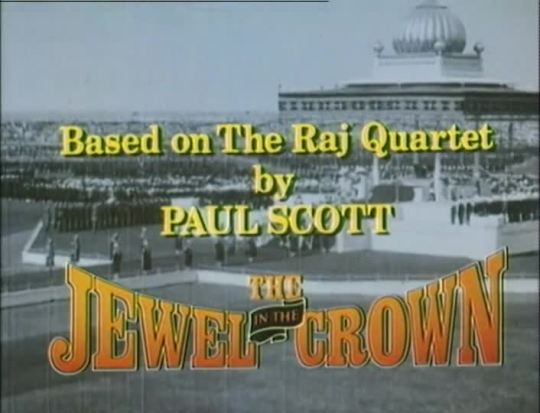

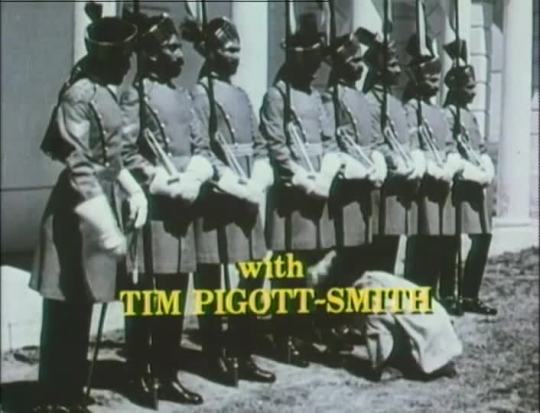
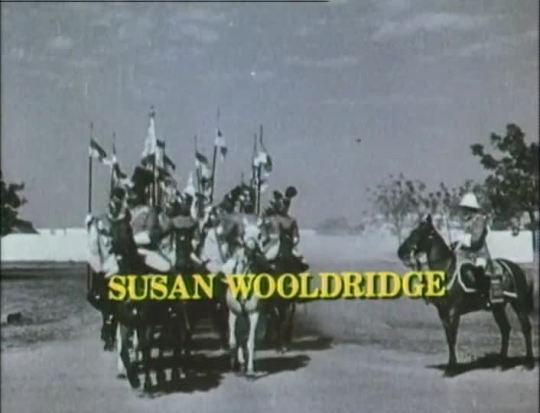
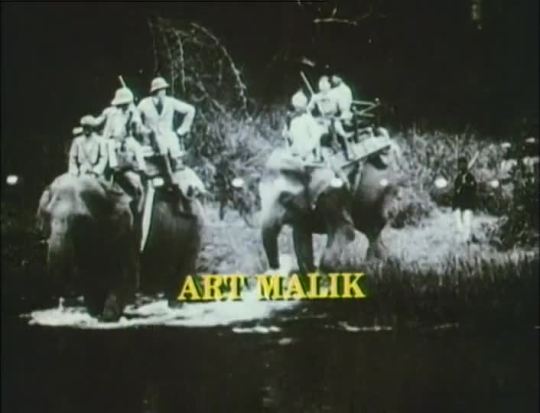
The Jewel in the Crown - ITV - January 9, 1984 - April 3, 1984
Period Drama (14 episodes)
Running Time: 60 minutes
Stars:
Peggy Ashcroft as Barbara Batchelor
Janet Henfrey as Edwina Crane
Derrick Branche as Ahmed Kasim
Charles Dance as Sgt Guy Perron
Geraldine James as Sarah Layton
Rachel Kempson as Lady Manners
Art Malik as Hari Kumar
Wendy Morgan as Susan Layton
Judy Parfitt as Mildred Layton
Tim Pigott-Smith as Supt./Capt/Maj/Lt Col Ronald Merrick
Eric Porter as Count Dmitri Bronowsky
Susan Wooldridge as Daphne Manners
Ralph Arliss as Capt. Samuels
Geoffrey Beevers as Capt Kevin Coley
James Bree as Maj/Lt Col Arthur Grace
Jeremy Child as Robin White
Warren Clarke as Cpl "Sophie" Dixon
Rowena Cooper as Connie White
Anna Cropper as Nicky Paynton
Fabia Drake as Mabel Layton
Nicholas Farrell as Edward "Teddie" Bingham
Matyelok Gibbs as Sister Ludmila Smith
Carol Gillies as Clarissa Peplow
Rennee Goddard as Dr Anna Klaus
Jonathan Haley and Nicholas Haley as Edward Bingham Jr
Saeed Jaffrey as Ahmed Ali Gaffur Kasim Bahadur, the Nawab of Mirat
Karan Kapoor as Colin Lindsey
Rashid Karapiet as Judge Menen
Kamini Kaushal as Shalini Sengupta
Rosemary Leach as Fenella "Fenny" Grace
David Leland as Capt Leonard Purvis
Nicholas Le Prevost as Capt Nigel Rowan
Marne Maitland as Pandit Baba
Jamila Massey as Maharanee Aimee
Zia Mohyeddin as Mohammad Ali Kasim
Salmaan Peerzada as Sayed Kasim
Om Puri as Mr de Souza
Stephen Riddle as Capt Dicky Beauvais
Norman Rutherford as Edgar Maybrick
Dev Sagoo as S.V. Vidyasagar
Zohra Sehgal as Lady Lili Chatterjee
Frederick Treves as Lt Col John Layton
Stuart Wilson as Capt James Clark
Leslie Grantham as Signals Sergeant
#The Jewel in the Crown#TV#Period Drama#ITV#1984#1980's#Tim Pigott-Smith#Susan Wooldridge#Art Malik#Charles Dance#Geraldine James
4 notes
·
View notes
Text
JOSEPH MERRICK The Elephant Man
JOSEPH MERRICK
5 August 1862 – 11 April 1890
The Elephant Man
Joseph Merrick, the ‘Elephant Man’ was an English man with a face and body suffering with deformities. He was believed to have had Proteus syndrome; a rare disorder also known as Wiedemann Syndrome.
He was born in Leicester, England and began developing abnormally in the first few years of his life. His mother died when he was aged 9, and his father remarried. Joseph left school aged 13 intending to find work and was rejected by his father and had to leave home. Aged 17, 1879, he started working at a workhouse for the next four years.
He contacted showman Sam Torr interested in being exhibited at a freak show. The group travelled to London and was exhibited in a shop across the street from London Hospital. Dr. Frederick Treves invited Joseph to the hospital to be examined and photographed. Tom Norman’s freak shop was closed by authorities and so they sent him to tour Europe. In Belgium he was robbed by one of his managers and was abandoned. He made his way back to London, and unable to communicate the police found Dr. Treves card on his person.
Joseph moved into the London Hospital and was invited to stay for the rest of his life. Treves visited him daily and the two became good friends. Joseph became well known in London society and was visited by Alexandra Princess of Wales.
Joseph died aged 27, in 1890 from asphyxia. Treves did the autopsy and said he had died of a dislocated neck, Joseph who had spent his life having to sleep sitting up due to the weight of his head, attempted to sleep lying down like other people.

#josephmerrick #theelephantman
0 notes
Text

#ProyeccionDeVida
📣 Kino Cat / Cine Tulipán, presenta:
🎬 “EL HOMBRE ELEFANTE” [Elephant Man]
🔎 Género: Drama / Biográfico / Discapacidad / Siglo XIX / Película de culto
⌛️ Duración: 125 minutos

✍️ Guion: David Lynch, Eric Bergren y Christopher De Vore
📕 Biografía: John Merrick
🎼 Música: John Morris
📷 Fotografía: Freddie Francis (B&W)
💥 Argumento: A finales del siglo XIX, el doctor Frederick Treves descubre en un circo a un hombre llamado John Merrick. Se trata de un ciudadano británico con la cabeza monstruosamente deformada, que vive en una situación de constante humillación y sufrimiento al ser exhibido diariamente como una atracción de feria. A medida que Merrick le cuenta todo por lo que ha pasado, el Dr. Treves descubre que tras la monstruosa fachada de Merrick yace un hombre apacible y amable

👥 Reparto: John Hurt (John Merrick), Anthony Hopkins (Dr. Frederick Treves), Anne Bancroft (Sra. Kendal), Frederick Treves (Concejal), Freddie Jones (Bytes), John Gielgud (Carr Gomm), Wendy Hiller (Señora Mothershead), Lesley Dunlop (Nora), Dexter Fletcher (Chico de Bytes), Phoebe Nicholls (Madre de Merrick) y Michael Elphick (Portero de noche)
📢 Dirección: David Lynch
© Productora: Paramount Pictures
👤 Productor: Mel Brooks
🌎 País: Estados Unidos
📅 Año: 1980

📽 Proyección:
📆 Martes 04 de Junio
🕘 9:00pm.
🐈 El Gato Tulipán (Bajada de Baños 350 – Barranco)
🚶♀️🚶♂️ Ingreso libre

0 notes
Text
A review of Elephant Man by Hala - 2024
Elephant Man is a drama released in 1980. This film tells the story of an « elephant man », who is used as a freak in a fair, so that his « owner » can make money. He will be found by a great surgeon, Frederick Treves ? ??? who will want to study him in order to learn more about the « creature ». he will host him at the hospital where he works and allow him to live a « normal » life until the moment when Merrick decides to sleep in the way he has always wanted to, on his back. This is the moment when he dies. In the film we can see that he is mistreated and how he is regarded by other people. It aslo includes suffering and his desire to be considered as a human being. Personally, I found this film interesting, p articularly so in relation to tolerance, which is an important topic in the film.
0 notes